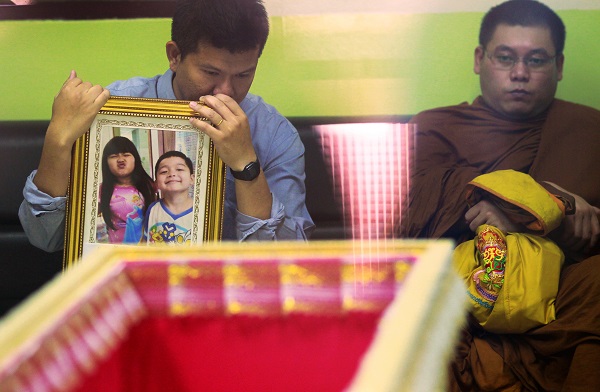
Tayakorn Yos-ubon, left, the father of two children killed in Sunday’s bomb attack on an anti-government protest site, holds their portrait as he waits with a monk for their bodies at a hospital in Bangkok, Thailand, Monday, Feb. 24, 2014. AP PHOTO/WASON WANICHAKORN
BANGKOK—Thailand’s army chief warned Monday the country risks “collapse” unless it pulls back from escalating violence after attacks in recent days left three children dead in the kingdom’s worst political unrest since 2010.
Twenty-one people have now been killed and more than 700 wounded in violence linked to almost four months of anti-government demonstrations.
Protesters want to unseat Prime Minister Yingluck Shinawatra and dilute the influence on Thai politics of her billionaire brother Thaksin, a former premier who lives in exile to avoid jail in Thailand for corruption.
A brother and sister, aged four and six respectively, and a 59-year-old woman died after a grenade attack on Sunday afternoon on a busy Bangkok shopping district.
Police said the grenade was fired into the crowd by unknown attackers from an M79 shoulder-held launcher.
They said an officer also died on Monday, nearly a week after being shot in the head in a gunbattle with protesters in Bangkok’s historic heart, a stone’s throw from the city’s backpacker zone, which killed five others—including another policeman.
Attacks have mainly been mounted in Bangkok, although a drive-by shooting late Saturday on a protest rally in the eastern province of Trat killed a five-year-old girl.
Unrest most severe since 2010
The current unrest is the most severe in the bitterly divided kingdom since protests by Thaksin-allied “Red Shirts” against a previous government in 2010 sparked clashes and a military crackdown that left more than 90 people dead.
“As days go by, there will be more violence until it cannot be controlled,” army chief Prayut Chan-O-Cha warned in a rare televised live speech.
“If losses continue, the country will collapse for sure and nobody will win or lose,” he said.
Prayut urged reconciliation and talks. He said troops are “ready to do their duty” but “do not want to use force and weapons to unnecessarily fight with the Thai people.”
He did not elaborate.
Supporters of Thaksin have accused the demonstrators of trying to incite the military to seize power again, in a country which has seen 18 successful or attempted coups since 1932.
The army chief’s comments are closely scrutinized for signs of possible intervention.
Violence ‘hard to control’
The head of the government’s security response to the protests also predicted more unrest.
“From now on violence will keep happening, for sure, so anyone who is not involved in the protests should not go to them,” said Labour Minister Chalerm Yubamrung. “I accept that it is hard to control.”
The government says it has been hamstrung by a court ruling last week banning it from using force to disperse peaceful protesters.
Authorities say semi-automatic weapons fired at them last week indicate the protesters have heavily armed support, while television footage has shown apparent protesters firing handguns in clashes.
The shocking deaths of the three children over the weekend earned swift condemnation from UN chief Ban Ki-Moon. Prime Minister Yingluck labelled them “terrorist acts”.
The UN children’s fund UNICEF also urged protesters to keep children away from the rallies, which have for many weeks been treated as boisterous family occasions.
Yingluck spent Monday inspecting local produce in a province 150 kilometers (90 miles) east of Bangkok, in a move seized on by her opponents as a sign she is on the run.
But a government spokeswoman told AFP she would return to Bangkok by the evening.
Protest leader Suthep Thaugsuban, who as deputy premier at the time oversaw the 2010 crackdown on the Red Shirts, said the government bore responsibility for the weekend violence.
“We use peaceful tactics… in past four months, we have never created any violence,” he told a rally.
Hatred for Thaksin drives the anti-government movement. Protesters allege he uses Yingluck as a proxy to run the government and has fostered widespread corruption, including buying elctions wins for the Shinawatra family.
They want to topple Yingluck and install an unelected “people’s council” to run the country to oversee loosely-defined reforms, before new elections are held in around a year to 18 months.
But Thaksin and his sister enjoy strong support in the rural north and northeast and are expected to have swept a snap poll called at the start of the month in a failed bid to defuse the turmoil.
The Red Shirts have vowed to defend the government, but have so far refrained from coming onto the streets.—Apilaporn Vechakij